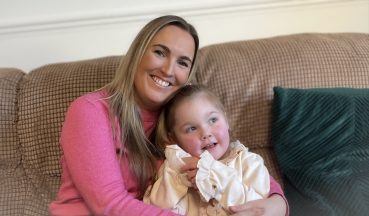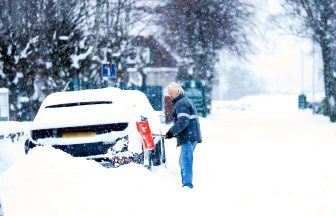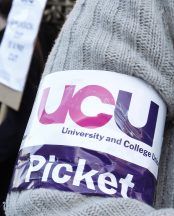Sales of Wellington boots and cold and flu remedies “fared well” last month, but sales overall took a real-terms dip in Scotland as the busy Christmas shopping period got off to a “miserable” start, according to monthly figures.
The “drookit” weather saw sales for such items do well, director of the Scottish Retail Consortium (SRC) David Lonsdale said, as the body’s latest monthly retail figures for October were released on Wednesday.
The busiest quarter in the retail calendar year got off to a “miserable” start in Scotland due to storms, floods and the ongoing cost-of-living crisis.
The SRC SRC-KPMG monthly retail sales monitor showed a 2.3% year-on-year decline in retail sales in October once adjusted for inflation, which represented the fourth consecutive month of real terms decline.
October is seen as the beginning of the busy Christmas shopping period.
Growth in grocery sales reduced, but lower-priced indulgences such as cosmetics and fragrances fared well, as did sales of Wellington boots and cold medicines.
Total sales last month increased by 2.9% compared with October 2022, when they had grown by 6.3%. Adjusted for inflation, the year-on-year decline was 2.3%, SRC said.
Food sales increased by 7.5% versus October 2022, when they had increased by 10.9%.
But adjusted for the estimated effect of online sales, total non-food sales decreased by 1.9% in October compared to the same period last year.
October was below the three-month average growth of 8.5% and the 12-month average growth of 12.1%. The three-month average was below the UK level of 7.9%.
David Lonsdale, director of the Scottish Retail Consortium, said: “Severe storms and repeated deluges and disruptions combined with lingering cost-of-living concerns to put a real dampener on Scottish retail sales last month.
“It was a miserable start to retail’s golden quarter. The significant weakening was the poorest monthly performance since July and a fourth consecutive month of real terms decline in the value of retail sales.
“The downturn was seen across all categories but was particularly pronounced in non-food, which saw its first decline since May.
“The growth in grocery sales continued to reduce, mirroring the fall in food price inflation.
“Lower-priced indulgencies such as cosmetics and fragrances fared well, as did sales of Wellington boots and cold and flu remedies – perhaps unsurprisingly, given the drookit conditions.
“Formalwear was a bright spot as people returned to corporate events and prepared for the looming party season, but clothing overall suffered as did sales of larger ticket items including white goods, electricals, and furniture.
“Hopefully, the downturn in sales is only temporary.
“That said, it may continue for a little while yet as indications are that households are delaying Christmas-related spending in the hope of grabbing a bargain during Black Friday discounting.
“With consumers so price-sensitive it is critical that the Chancellor and Finance Secretary in their upcoming Budgets seek to support consumer confidence whilst helping retailers to keep down prices at the tills.
“The marked deceleration in shop price inflation should assist, as should the temporary discounts to peak rail fares and mooted council tax freeze.
“However, we need to see ministers rule out a hike in the business rate which would add significantly to shopkeepers’ outgoings and put upward pressure on prices for consumers.”
Paul Martin, partner, UK Head of Retail at KPMG, said: “The upcoming Christmas season poses challenges for retailers as they compete for a shrinking share of consumer spending through promotions, further squeezing already tight margins.
“Anticipated lower spending levels make this Christmas season potentially the most challenging since before the pandemic.”
Follow STV News on WhatsApp
Scan the QR code on your mobile device for all the latest news from around the country





























